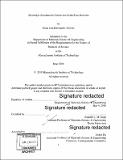Electrolyte selection for cobalt-free solid-state batteries
Author(s)
Hernandez Alvarez, Erick Ivan
DownloadFull printable version (1.700Mb)
Other Contributors
Massachusetts Institute of Technology. Department of Materials Science and Engineering.
Advisor
Jennifer L. M. Rupp.
Terms of use
Metadata
Show full item recordAbstract
Lithium-ion batteries are widespread in use due to their thermal stability and high energy density. The most common design uses an organic electrolyte and lithium-cobalt electrode. While safe under typical operating conditions, the use of an organic electrolyte subjects the battery user to certain risks; in particular, Li-ion liquid batteries are explosive when exposed to air and subject to thermal runoff, making them highly sensitive to any physical damage. The use of cobalt also poses a moral concern, as the mining and sourcing of cobalt is geographically restricted and most commonly sourced from countries that have a history of foreign exploitation and child labor. An all solid state battery is suggested as a possible alternative battery that reduces operation risks and maintains similar performance characteristics. Lithium-lanthanum-zirconium oxide is presented as a suitable electrolyte replacement. Coupled with cobalt-free electrodes, this battery design would provide a safer, more responsible battery.
Description
Thesis: S.B., Massachusetts Institute of Technology, Department of Materials Science and Engineering, 2018. Cataloged from PDF version of thesis. Includes bibliographical references (page 30).
Date issued
2018Department
Massachusetts Institute of Technology. Department of Materials Science and EngineeringPublisher
Massachusetts Institute of Technology
Keywords
Materials Science and Engineering.